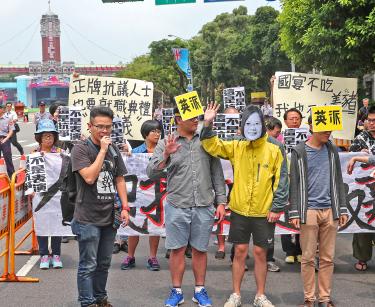The Democratic Progressive Party (DPP) yesterday said it would remove a controversial section of the parade to celebrate the presidential inauguration today, following criticism from social groups.
“The performance is meant to show that we were able to bid farewell to our authoritarian past and move on to democratization, because countless people made sacrifices. We cherish the history, and we have not forgotten these brave people,” DPP News and Information Department director and Presidential Office spokesman-designate Alex Huang (黃重諺) said. “We therefore planned to re-enact the history on inauguration day, to remind ourselves and remind everyone in this country that the democracy we enjoy today is the fruit of people’s efforts and struggles.”
Huang said the performance is to serve as a reminder to the new government that it should not disregard the public’s voice when in power.
However, following criticism by social campaigners, the DPP would only keep the parts celebrating democracy, while removing the part depicting social movements, Huang said.
Originally, the entire performance was to include people marching in front of the Presidential Office Building holding slogans from various social movements in recent years, such as the movement against forced expropriation and demolition of private homes in Dapu Borough (大埔) in Miaoli County’s Jhunan Township (竹南), as well as the anti-nuclear movement.
However, the skit triggered harsh criticism from social campaigners when it was shown during a public rehearsal on Wednesday, especially when a group of activists against the demolition of Huaguang Community (華光) in Taipei’s Daan District (大安) were dispersed by security personnel when they walked near the Presidential Office Building on their way to the Taiwan High Court, where they were facing prosecution for participating in a demonstration.
Amber Shyu (徐玉紅), a resident of Taoyuan’s Gueishan District (龜山) who had been fighting against the forced demolition of her family’s home for years, also criticized the skit.
“Many people who were involved in social movements, including myself, are still facing prosecution and have to appear in court on the inauguration day,” she said. “The performance is like rubbing salt into our wounds.”
Despite the DPP’s decision to withdraw the controversial skit, activists said the DPP’s handling of the issue showed its “arrogance.”
“Even if [the DPP] was willing to make revisions, it only did so because of the protests, which is ridiculous because we should not have to protest in the first place to remind the party not to be so presumptuous,” Alliance for Workers of Closed Factories member Lu Chyi-horng (盧其宏) said.
Lu also blasted the DPP for leaving in depictions of earlier democratization movements.
“There were many different groups involved in the dangwai [黨外, outside the party] movement, so how can the DPP as one party claim to represent Taiwan’s democratization process. This is just another form of arrogance,” Lu said.
About 30 protesters from the Workers’ Struggle Alliance, Taiwan Rural Front and other groups earlier yesterday gathered at the site of the inauguration ceremony in front of the Presidential Office Building, chanting that the “people’s struggle” is not a “circus” to be deployed by those in power.
They performed a skit showing president-elect Tsai Ing-wen (蔡英文) and associates eating tofu stained with the blood of activists, playing off the Mandarin phrase “eating tofu” (吃豆腐), meaning to take advantage of others.
“We used our bodies to show the people how awful the Chinese Nationalist Party [KMT] was and now you’re stepping on us as you move up to take the presidency,” National Alliance for Workers of Closed Factories secretary-general Chen Hsiu-lian (陳秀蓮) said, adding that the DPP’s actions showed that Tsai was already “dizzy with power.”
Taiwan Rural Front researcher Hsu Po-jen (許博任), who is also Green Party Taiwan secretary-general, said it was “extremely painful” to see past slogans commandeered for the skit.
“The Tsai administration has taken what we have spilled blood and tears over to embellish her inauguration ceremony, but she has never made any promises over what policy or structural changes she would implement,” he said, adding that the DPP had failed to meaningfully support social movements during President Ma Ying-jeou’s (馬英九) eight years in office.
“The people’s struggle is not a prop — our blood and tears were not a show,” Taiwan Rural Front spokesperson Chen Ping-hsuan (陳平軒) said.
“We oppose arrogance in government — not just the KMT. If the DPP does not repent, it will be the next administration to be taken down,” he added.
Separately, former Presidential Office secretary-general Yeh Chu-lan (葉菊蘭), whose husband Deng Nan-jung (鄭南榕) ran a series of dissident magazines and in 1989 self-immolated in protest against the then-KMT government’s restrictions on freedom of speech, said the decision to remove the controversial part is the reason people voted for Tsai.
“She listens to the people and makes changes when she realizes that she might have made a mistake,” Yeh said.
Source: Taipei Times - 2016/05/20





















